- Home
- James Rollins
Blood Brothers (the order of the sanguines) Page 2
Blood Brothers (the order of the sanguines) Read online
Page 2
He stared at the long tables filled with exotic plants. Some of the orchids he’d known for years, watching them flower over and over again throughout his lonely childhood.
Since he was a little boy he had come here to watch his mother work with the orchids, crooning to them, misting them gently, stroking their leaves, giving them the love that she did not give to him. They were special and rare and beautiful — and he was not.
He’d had a secret dream that when he grew up he would do something so wonderful that she would look up from her pots and notice him.
But now that would never happen.
She had died two days ago, taking her own life in one of her fits of black melancholy. Today she had been planted in the earth like one of her beloved orchids.
He ran his thumb across the sharp knife.
He’d overheard the staff talking about the value of his mother’s orchid collection. She had spent a lifetime accumulating it — buying each plant from a funny little man dressed all in black with a bowler hat. He gathered them from botanical gardens around the world, from other collectors, and even from men who traveled into the distant rain forests and brought the specimens out in burlap sacks.
Now all her precious orchids would die or be sold.
A light winter rain began to patter on the glass roof and ran down the sides in streaks. Arthur laid the cold knife blade against the warm softness of his forearm.
This is how she did it…
Before he could act, the greenhouse door slammed open, and Arthur jumped.
The knife clattered to the tile floor.
Only one person dared to crash around the estate like that. Christian had come to the London house when both boys were fourteen. Christian’s parents had died in a car crash outside of San Francisco. Arthur’s father was second cousin to the boy’s father and took the teenager into their home. Though the two boys were related, it was only in blood — not in demeanor.
“Arty?” he called brashly. “I know you’re in here.”
Arthur stirred on the bench, and Christian spotted him, crossing over to join him. Christian’s brown hair was slicked flat from the rain, and his bright green eyes were puffy and rimmed in red. Unlike Arthur, Christian could let himself cry when he was hurt. It was an American trait. Something Arthur’s father and mother would never tolerate.
Reaching the bench, Christian pulled the dark lens cap off his camera. He carried the thing everywhere. He took pictures all day and spent half the night in a makeshift darkroom developing them. Arthur’s mother said that he had real talent, and she would not have said that if it weren’t true.
Christian planned to become a photojournalist. He wanted to travel to the world’s war zones, taking pictures — using his art to change the world. He’d even convinced Arthur that he could come along, too, as a journalist. They’d be a team. Arthur wasn’t sure that he had the talent for such a career, but he liked to be drawn into Christian’s whimsies. The other boy had a reserve of boundless optimism that Arthur often warmed himself against.
But today even that wasn’t enough.
Christian snapped a picture of the abandoned pruning knife on the tiles, then turned toward the rows of specimen tables. He headed to his favorite orchid: the Brassocattleya cross.
First, he took a close-up shot of the blossom, then he pinched off a dead leaf and felt its edges to see if it was moist, just as their mother used to.
“She’ll miss these flowers,” Christian commented.
Certainly more than me, Arthur thought dourly.
Christian plucked the flower, and Arthur gasped.
Mother would never have allowed that.
Christian dropped the flower on Arthur’s lap and picked up the pruning knife from the floor.
Arthur watched the blade. He imagined how it would feel if it cut into his wrists, how the blood would well out and drop onto the floor. His mother would know. She’d used a long knife from the kitchens to slit her wrists in the bath. When Arthur found her, the water was such a deep red that it looked as if the whole tub had been filled with blood.
Christian touched the inside of Arthur’s wrist. His fingers slid back and forth along the same spot where his mother had used the kitchen knife.
“Do you think it hurt much?” Christian asked, not shying from the harder questions. His fingers still rested on Arthur’s wrist.
Arthur shrugged, suddenly nervous — not at the subject matter but at the intimacy.
Christian moved his fingers aside, replacing his touch with that of the cold edge of the pruning knife.
Arthur stayed very still, hoping.
Christian took a deep breath, then sliced into Arthur’s wrist — but not too deep. It didn’t hurt as much as he had anticipated. No more than a sting really.
Blood welled out.
Both boys stared at the shiny scarlet line on Arthur’s white skin.
“She left me, too,” Christian said and put the flower into Arthur’s hand.
Arthur clenched his fist, crushing the orchid, and more blood flowed out of his wound. “I know.”
“My turn now.” Christian drew the bloody blade across his own wrist.
“Why?” Arthur asked, surprised.
Christian turned his arm over and dropped his wounded wrist on top of Arthur’s. Their warm commingled blood ran down their arms and dripped onto the clean-swept floor.
With his other arm, Christian took several snapshots: of the crimson drops on the white stone tile, of the bloody flower crumpled on the bench. Last, Christian angled the camera up to take a picture of the two of them together, their arms linked.
“I will never leave you,” Christian whispered to him. “We’re blood brothers, now and forever.”
For the first time since Arthur had found his mother in the crimson water — her stained blond hair floating on the surface, her head tilted back to stare at the plaster ceiling — he broke down and wept.
Arthur felt a hand shove him from behind, stumbling him back to the present.
“Get off my porch!”
He turned to discover a middle-aged woman standing there — about the same age his mother would have been if she’d lived. She scolded him and herded him off her home’s stoop, her flannel nightgown billowing in the night breeze.
Arthur’s reporter instincts came back. “Did you see anything?”
“None of your business what I saw.” She crossed her arms over her chest and sized him up. “But I can say that I don’t like how this Summer of Love has turned out.”
Later, when Arthur filed his story, the headline read Summer of Death follows the Summer of Love.
* * *
“I still haven’t heard any word from Christian,” Wayne said over the phone three days later. “Our friends in the city haven’t either.”
Arthur frowned, cradling the phone to his ear as he sifted through piles of police reports and forensic exams from the latest murder, a third victim. The young man was named Louis May, recently arrived from Kansas City. Like Christian, the man had likely been drawn by the promise of California, a modern-day gold rush of free love and openness, only to die on the sidewalk, his throat torn open and a flower in his hand.
Had the same happened to Christian? Was his body yet undiscovered?
“But something strange happened this morning,” Wayne said, interrupting Arthur’s line of worry.
“What?” He sat straighter and let the papers settle to the tabletop.
“A Catholic priest came by, knocking at my door at an ungodly early hour.”
“A priest? What did he want?”
“He asked if I knew where Christian might be, where he hung out, especially at night. Strange, huh?”
Strange barely fit that description. Despite his brother’s name, Christian had no religious affiliation. In fact, he only had disdain for those who piously bent their knees to an uncaring god, like Arthur’s parents had. So why would a priest be interested in his brother?
As if hearing Arthur’s silent question, Wayne explained. “The priest said it was important that he find your brother and talk to him. Said Christian’s immortal soul hung in the balance. He told me to tell Christian that he could turn his back on what he’d become and accept Christ into his heart and find salvation. Those were his exact words.”
Arthur swallowed, hearing an echo of his own words to Christian on that last night, words that could not be easily taken back. He had called Christian names, demanded he change, telling him that the path Christian had chosen would only lead to a lonely death. Their argument had grown more and more heated until the brothers fled from each other.
The next day, Christian was gone.
“You should have seen that guy’s eyes,” Wayne continued. “Scared the hell out of me, I have to say. Never met a priest like that. What do you think he really wanted?”
“I have no idea.”
After that call, Arthur sat in his tiny rented room, studying pictures and news clippings taped to the walls. Like Christian, all the victims were men in their twenties. They were dark-haired and handsome.
Arthur stared at a publicity photo of Jackie Jake. The folksinger’s black hair flopped over his eyes, reminding Arthur acutely of Christian. Jake even had the same bright green eyes.
It was at that moment that Arthur realized he didn’t have a single picture of his brother. After their quarrel, in a fit of pique, Arthur had destroyed them all. In many ways, he was as volatile and temperamental as his mother — and in the end, just as judgmental.
Arthur had been a fool back then. He knew it now. He wanted only to find Christian and apologize, but he worried that he might never get that chance. He could never make it right.
Over the following three days, he buried himself in the case, sensi
ng Christian was linked to the murders. But how? Was he a victim, or somehow involved? The latter seemed impossible. Still, he remembered the madman at the memorial service. Could Christian have been drugged, maybe brainwashed by some murderous cult, and turned into a monster?
Needing answers, Arthur started his investigation with the orchids, but too many of the city’s flower shops sold them. He showed around the picture of Christian from Wayne’s flyer, but none of the shopkeepers remembered any particular customers buying those orchids around the times of the murders. It was no surprise. It was summer, and orchids were in demand for the dances of the upper class, those lofty creatures of wealth far removed from the men who lived on the streets or in squat houses or died holding one in their hands.
He touched base with Officer Miller every day, hoping for any news. All the while, the city held its breath for the next murder. Arthur learned from Miller that the latest victim, like the others, had also received his orchid on the morning of his death. It had been delivered to Louis May’s stoop, and twelve hours later the young man was dead.
With morning coffee in hand, Arthur contemplated this cruelty, this promise of death delivered to a doorstep. He climbed to his rented room and returned to his cluttered workspace.
There, resting on the keys of his typewriter, was a single white bloom.
A Brassocattleya orchid.
* * *
“Look, Mr. Crane,” Officer Miller said. “I can imagine you’re spooked, but folks around here think this might be as a publicity stunt. To sell more papers.”
Arthur stared dumbfounded across Miller’s desk into the crowded squad room. He had come straight here after finding the orchid. Right now it lay on the battered metal desk in front of him. “You can’t think—”
Miller held up a beefy hand. “I don’t. I trust you plenty, but I can’t help you. My hands are tied.”
Arthur’s stomach sank. He’d been fighting the police for hours, hoping for some kind of protection, but no one took him seriously. “How about I just sit in the police station then? Just for twenty-four hours?”
“I can’t allow you to do that.” Miller’s freckled face looked concerned, but his chin was firm. He wouldn’t give in.
“Then arrest me.”
Officer Miller laughed at him. “On what charge?”
Arthur punched him right in his freckled face.
* * *
It took three days for the Times to bail Arthur out. In the interim, a fourth victim had received an orchid and had been murdered. The new death further convinced the police that Arthur either had been lying about the orchid or someone had played a cruel prank on the British reporter.
Arthur knew better.
Still, what did it mean? Had the killer passed him by? Or was he just biding his time to make the kill?
Not knowing for sure, Arthur spent his first night of freedom in Sparky’s twenty-four-hour diner, afraid to go home. He brought a giant pile of notes and used the time to outline a book, a treatise about the murders. Truman Capote’s In Cold Blood had come out two years ago, and the narrative of those killers had mesmerized him. He wanted to do something similar, to find some way of making sense of these deaths, to nail them down between the cold, dispassionate pages of a book.
Seated at a corner table of the diner, with a clear view to all the exits, he nibbled on his third piece of apple pie and downed his umpteenth cup of coffee. All night long, he had refused to give up his table, despite the jaundiced glances from the waitress.
But now the sky had pearled to a pale gray, and he knew it was time to move on. He could not live inside the diner forever. So he packed up his things, left a generous tip for the waitress, and trudged toward his apartment. As he walked, he rubbed the grit from his exhausted eyes. He squinted at the sun breaking over a boarded-up and abandoned storefront ahead. The five-story building had become the home of squatters. It was regularly raided, emptied, only to fill again.
As he crossed along it, he hefted his satchel of notes. He knew he could get a book out of these murders, something dark and fascinating and significant, the kind of thing that could make his career.
A few meters away, a figure stepped out of the door of the dilapidated store, sticking to the shadows. Even though he was barely visible in the gloom, Arthur recognized him and stopped, stunned and incredulous.
“Christian…?”
Before he could react, his brother was upon him, pulling him tightly in an embrace that was both intimate and frightening. Fingers dug into his shoulders, his elbow, hard enough to find bone.
Arthur gasped, tried to pull away, but it was like trying to unbend iron. Pain weakened him further, forcing him to drop his bag.
Lips moved to ear. “Come with me.”
The breath was icy, smelling of sour meat and rot. The tone was not one of invitation but of demand. Arthur was lifted off his feet and dragged away, as easily as a mother with an errant child.
In a moment, they were through the doorway and up a flight of rickety stairs to an upper room. Refuse littered the floor. Old ratty blankets bunched along the walls, abandoned by their former dwellers. The only place of order was a thick oak table in the center, its surface polished to a high sheen, so out of place here.
As was the smell.
Past the reek of sweat, waste, and urine came the wafting sweetness of honeysuckle and gardenia. The scent rose from a spray of white orchids, all Brassocattleya.
If Arthur had any doubts as to the role Christian played in the recent murders, they were dispelled at this sight. The table looked like a shrine or an altar to some dark god.
Arthur tried to struggle out of that iron grip, but he could not escape the hand clamped to this forearm. For his efforts, he was slammed against a wall, hard enough to bruise his shoulder, and pinned there. Fearing for his life, he searched for his only weapon, the same weapon that once drove the two brothers apart in the past.
His words.
But what could he say?
Arthur looked at his attacker, dismayed by what he found there. Christian looked exactly the same — yet completely changed. His face and bearing were as they always had been, but now he moved with a speed and strength that defied reason. Worst of all, his gentle expression had turned hard and angry. Malice shone in eyes that were once bright and full of joy.
Arthur knew this dreadful condition must be secondary to some kind of drug. He remembered the madman in the church, recalled the horror stories he had read of addicts on a new pharmaceutical called PCP. The drug had arrived in the Haight-Ashbury district just last year.
Was that the explanation here?
“You can stop this,” Arthur tried. “I can get you help. Get you clean.”
“Clean?” Christian pushed his lips up into a ghastly grimace and laughed, a mocking rendition of his usual playful mirth.
Changing tactics, Arthur tried reaching him through their shared past, to draw him out, to make him remember who he once was. “Brassocattleya,” he said, nodding to the table. “Like Mother grew and loved.”
“They were for you,” Christian said.
“The orchids?”
“The murders.” Christian faced him, showing too many teeth. “The orchids were merely to lure you here. I knew you were at the Times and hoped word of the orchids would draw you here. That’s why I took that singer first, the one from London.”
Arthur went cold, picturing Jackie Jake’s face. He had contributed to the poor man’s death.
“You came sooner than I expected,” his brother said. “I had hoped to leave a longer trail of invitation before entertaining you here.”
“I’m here now.” Arthur’s shoulder throbbed, aching even his teeth. “Whatever is wrong between us, we can fix it together.”
Christian exposed his arm, turning it to reveal the pale scar on his wrist. Arthur had a matching scar.
“That’s right,” Arthur said. “We’re blood brothers.”
“Forever…” Christian sounded momentarily lost.
Arthur hoped this was a sign of him finally coming out of his dark, drug-fueled fugue. “We can be brothers again.”
“But only in blood.” Christian faced him, his eyes hard and cold. “Isn’t that right?”
Before Arthur could answer, Christian threw him to the floor, riding his body down and straddling atop him. His brother’s white face hovered inches above his, those eyes reading his features like a book.

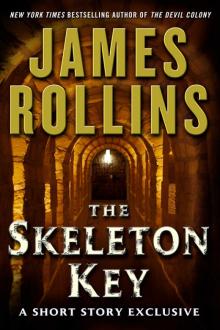 The Skeleton Key
The Skeleton Key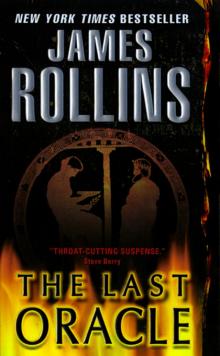 The Last Oracle
The Last Oracle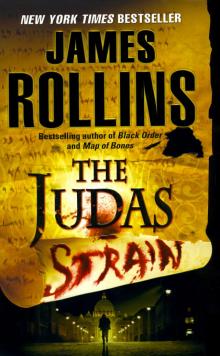 The Judas Strain
The Judas Strain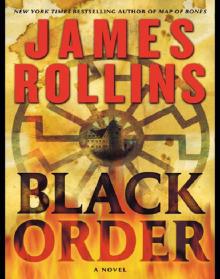 Black Order
Black Order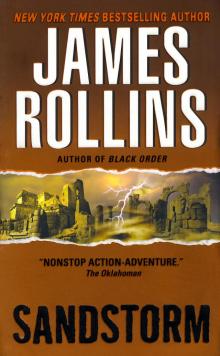 Sandstorm
Sandstorm Ghost Ship
Ghost Ship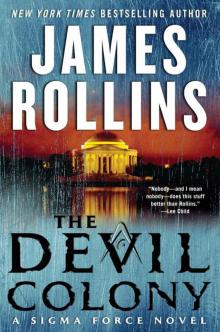 The Devil Colony
The Devil Colony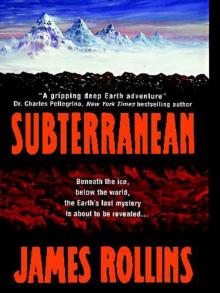 Subterranean
Subterranean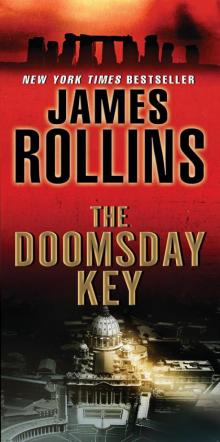 The Doomsday Key
The Doomsday Key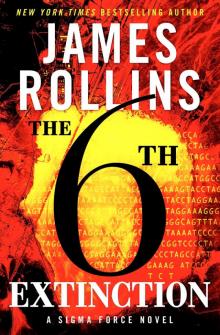 The 6th Extinction
The 6th Extinction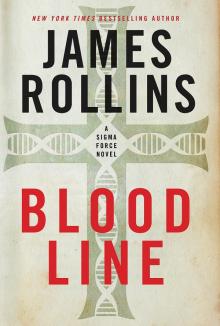 Bloodline
Bloodline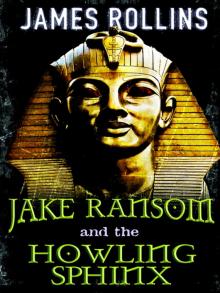 Jake Ransom and the Howling Sphinx
Jake Ransom and the Howling Sphinx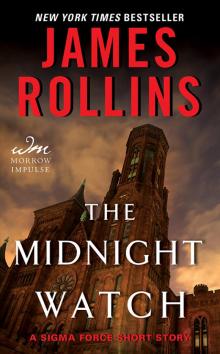 The Midnight Watch
The Midnight Watch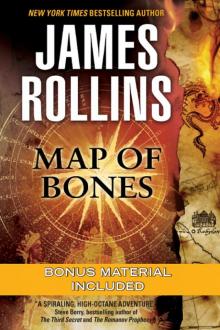 Map of Bones
Map of Bones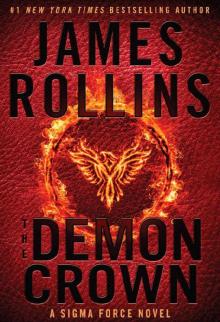 The Demon Crown
The Demon Crown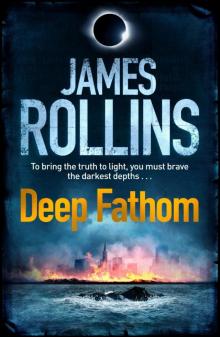 Deep Fathom
Deep Fathom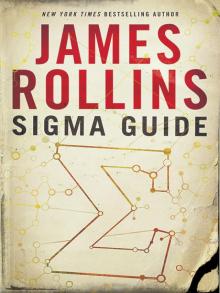 Sigma Guide
Sigma Guide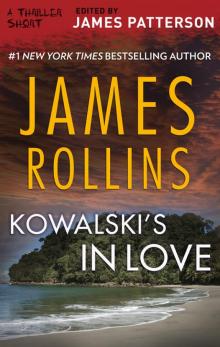 Kowalski's in Love
Kowalski's in Love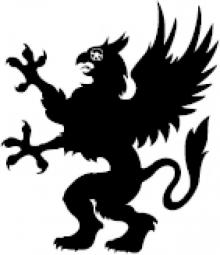 Jake Ransom and the Skull King's Shadow
Jake Ransom and the Skull King's Shadow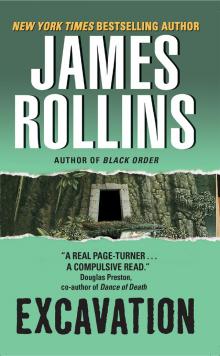 Excavation
Excavation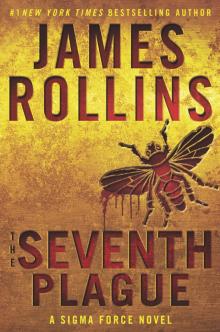 The Seventh Plague
The Seventh Plague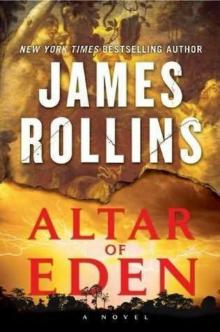 Altar of Eden
Altar of Eden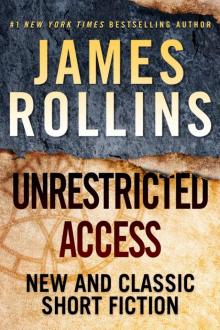 Unrestricted Access: New and Classic Short Fiction
Unrestricted Access: New and Classic Short Fiction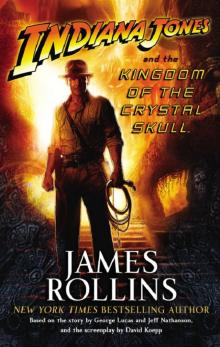 Indiana Jones and the Kingdom of the Crystal Skull
Indiana Jones and the Kingdom of the Crystal Skull Crucible
Crucible The Eye of God
The Eye of God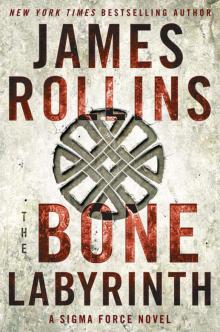 The Bone Labyrinth
The Bone Labyrinth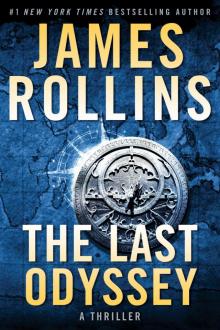 The Last Odyssey: A Thriller
The Last Odyssey: A Thriller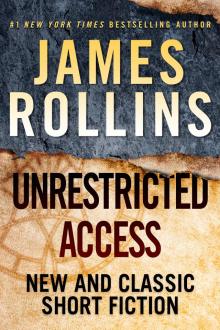 Unrestricted Access
Unrestricted Access Amazonia
Amazonia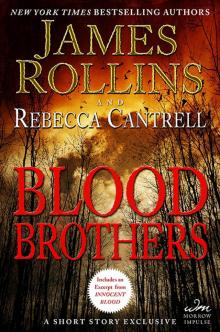 Blood Brothers: A Short Story Exclusive
Blood Brothers: A Short Story Exclusive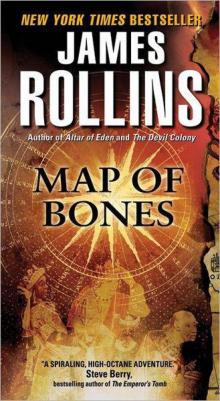 Map of Bones: A Sigma Force Novel
Map of Bones: A Sigma Force Novel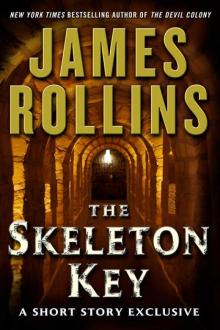 The Skeleton Key (sigma force)
The Skeleton Key (sigma force)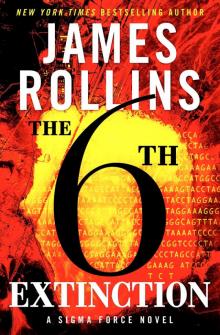 Sigma Force 10 - The Sixth Extinction
Sigma Force 10 - The Sixth Extinction Innocent Blood
Innocent Blood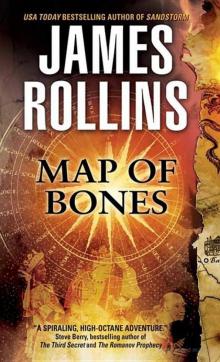 Map of Bones sf-2
Map of Bones sf-2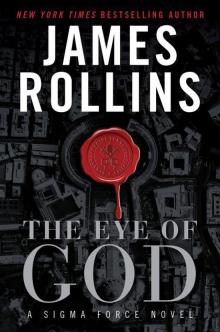 The Eye of God: A Sigma Force Novel
The Eye of God: A Sigma Force Novel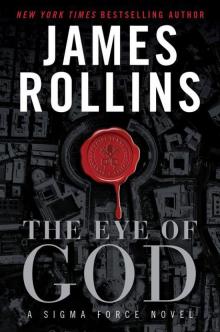 The Eye of God: A Sigma Force Novel sf-9
The Eye of God: A Sigma Force Novel sf-9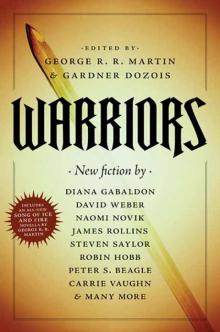 The Pit
The Pit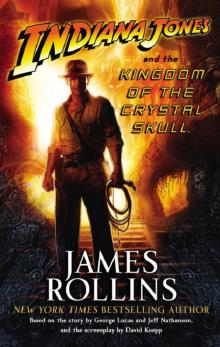 Indiana Jones and the The Kingdom Of The Crystal Skull
Indiana Jones and the The Kingdom Of The Crystal Skull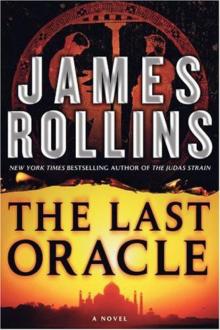 The Last Oracle (2008) sf-5
The Last Oracle (2008) sf-5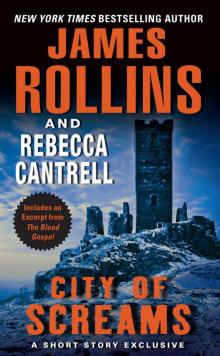 City of Screams
City of Screams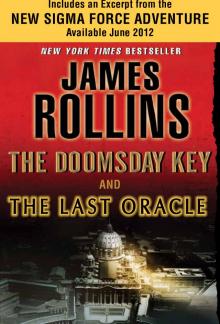 The Doomsday Key and The Last Oracle with Bonus Excerpts
The Doomsday Key and The Last Oracle with Bonus Excerpts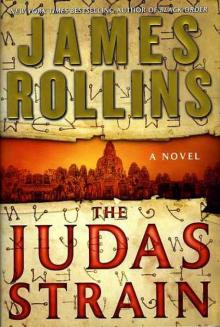 The Judas Strain sf-4
The Judas Strain sf-4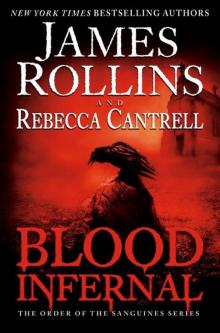 Blood Infernal
Blood Infernal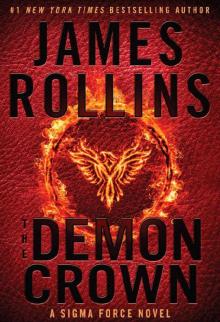 The Demon Crown: A Sigma Force Novel
The Demon Crown: A Sigma Force Novel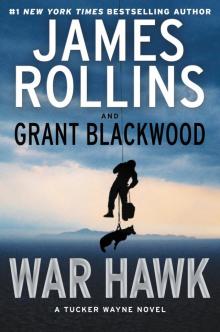 War Hawk: A Tucker Wayne Novel
War Hawk: A Tucker Wayne Novel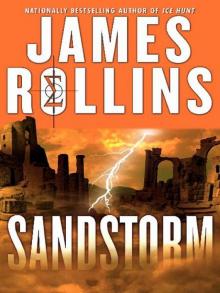 SANDSTORM sf-1
SANDSTORM sf-1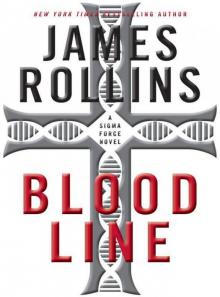 Bloodline: A Sigma Force Novel
Bloodline: A Sigma Force Novel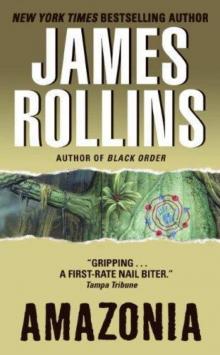 Amazonia: a novel
Amazonia: a novel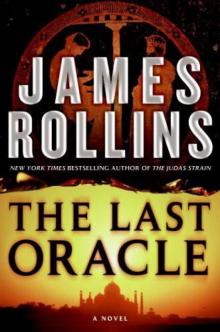 The Last Oracle: A Sigma Force Novel
The Last Oracle: A Sigma Force Novel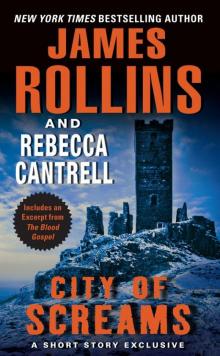 City of Screams (the order of the sanguines)
City of Screams (the order of the sanguines)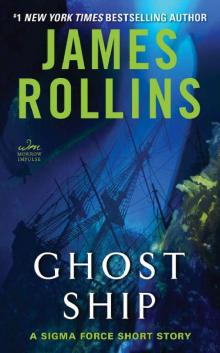 Ghost Ship: A Sigma Force Short Story
Ghost Ship: A Sigma Force Short Story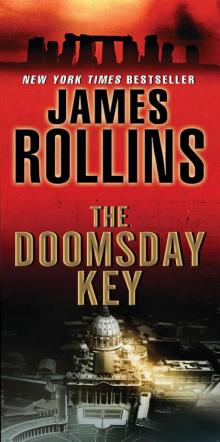 The Doomsday Key: A Sigma Force Novel
The Doomsday Key: A Sigma Force Novel